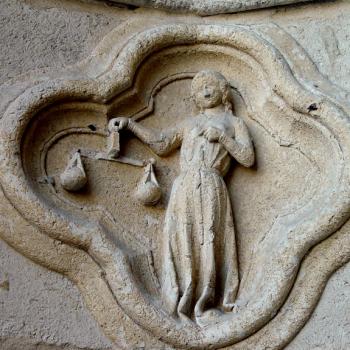
Sin is a tragic mistake, one which we often make in our lives. The more we sin, the more it tries to trap us, making us think we should stop struggling against it, and so give in to its demands. It makes us think we are not worthy of being loved, and once we accept that idea, we allow ourselves to be consumed by its nihilistic malice. While we might not be perfect, while we might sin, and so defile and wound ourselves by it, we are not our sin. We are not defined by our sin. Who we are, by nature, is good; we are made in the image and likeness of God. Nothing we do can entirely destroy that goodness. No matter how much sin wounds and defiles us, that good remains, and as it remains, not only is there something in us worthy of being loved, it is loved by God. Thanks to that love, God desires to heal us from the wounds of sin and cleanse us from its defilement, allowing the good within us to flourish. We should, of course, be sorry for our sin, but such sorrow should be the sorrow borne out of love. It is the sorrow one feels once one has learned how they have disappointed their beloved, and so the kind of sorrow which makes one want to be better. To engage such love, then, we should not despair. Sin wants us to despair, to think we cannot be saved, so that we allow it to eat away at us, until at last, we totally give into its nihilism, doing all that it would suggest us to do (such as killing ourselves), because we think nothing we do can matter because of the power sin has in our lives, as St. Gregory of Narek indicated:
By the same token, if someone is in mourning over a sin which he has committed, he should not mourn excessively, lest he fall into despair and say, ‘There is no salvation for me,’ and because of that either not turn from his sin or suffer the suffering of Judas, who hanged himself because there was no possibility of repentance: that was excessive mourning. [1]
God’s love is all around us. It is the source and foundation of our creation, our preservation, and indeed, of our salvation. God’s love is greater than our sin, and so, though we should be sorry for our sin, we should realize God’s love remains open to us, and will continue to give us all the blessings we need if we but open ourselves up to it. Through that love, we will find ourselves doing what God wishes, so that love can and will be the source of our virtue, giving us the ability to do what we know we should do:
Sacred love is the mother of (spiritual) well-being and immaculate chastity; it prompts and encourages the pursuit of virtue and every good deed. Love is the source of all good things; those who are holy drink from it. It is the pledge of all the blessings and the great gifts distributed by God. Love is the flow of Christ’s beneficence; it adorns his boundless grace; it dissipates strife and grants peace; it illuminates the mind and the members (of the body). [2]
Sin is to be taken seriously – as it has been taken so seriously by God. The torments brought to us by sin are real, because sin wounds what is touches; this is why it is said that sin brings about its own punishment. If we, for some reason, should embrace sin for eternity, we would experience eternal torments. Because we have a way to move beyond our sin, to be set free from its trap, because God’s love is for us, working for us, doing all that can be done to make sure we get out of that trap, our focus should be on that love. If we, for some reason, were to focus on the torments which we might make for ourselves, we lose sight of the light which can and should set us free; we let the darkness overtake us and so get caught up with despair. Bulgakov, therefore, was right when he said:
There is no need to be intimidated by eternal torments – this is unworthy of the Christian soul, although without a debt there will be indeed such torments. But what is needed is a constant seriousness and rectitude in life, what is need is a remembrance that God is loving, solicitous, filial; how can we avoid grieving our Father? How can we avoid losing ourselves our eternal countenance, in this stream of evil and vanity? By never forgetting: never forget what it is you love, never forget what it is you serve, and above all never forget Your God for whom you labor.[3]
And, while it might seem contradictory, we must remember that every time we face temptation, we can find ourselves drawn closer to God:
Every temptation experience – despite the sin – brings us closer to God and softens our hearts towards others, it leads us out of the undue equilibrium for which self-satisfied and pharisaical pride lies in wait. We must acquire a peaceful spirit, but a peaceful spirit is different from equilibrium, which is merely the absence of misfortune and temptations. [4]
The key, therefore, is to let ourselves be moved beyond ourselves, to be moved by love, and not become self-satisfied, for when we are self-satisfied, we become closed off to all which is beyond ourselves, including God and all the grace God intends to give us. Love draws us out of ourselves, making sure we do not become stuck as we are. Love makes sure we do not become stuck with despair, nor with the rot which sin brings to us when we sin. God does not force us to respond to the love and grace which we are offered. That is, God, out of the great transcendent love God has for us, gives us room to respond to that love with love or its denial, and so to move beyond ourselves (which is what dying to the self is meant to do) or to stay put, as if turned into stone. Many spiritualities, though they have good elements in them, falter because they do not have us act in and out of such love; this is why, even if they have great ideas presented by them, like quietism does (for quietism borrows much from authentic spiritual traditions), they end up being contrary to those traditions and lead to a dead end (as quietism moves us away from acting out of love and do nothing). Love makes room for the beloved and waits for the beloved to act. The love of God makes room for us, and so in the resurrection, as Solovyov put it, we find any suggestion of quietism, any suggestion that we have nothing to do, is denied, for in it Christians are told to act with love, to engage the resurrection, not only for themselves, but for the world: “In fact, since Christ, though resurrected, can do nothing final for us without us ourselves, then there can be no danger of quietism here for sincere and conscientious Christians.” [5]
Love remains the key. Sin seeks to divert us from love, to cut us off from it, so that we end up with none of love’s glory in our lives. It turns us away from love, and its activity. Without love’s glory, without the graces shared to us by love, it is easy to give up. But since deep within there remains the image of God in us, the image of love, sin cannot do as it wishes; it cannot entirely drive love away from us. All we need to do is look deep within and see God, and God’s love, shining in us from the center of our being. And then the power of sin, the illusion it brings, will be dispelled as we will know that we are loved at the core of our being.
[1] Roberta Ervine, trans., The Blessing of Blessings: Gregory of Narek’s Commentary on the Song of Songs (Kalamazoo, MI: Cistercian Publications, 2007), 134.
[2] Moralia et Ascetica Armeniaca: The Oft-Repeated Discourses. Trans. Abraham Terian (Washington, DC: CUA Press, 2021), 169 [Discourse 11].
[3] Sergius Bulgakov. Spiritual Biography. Trans. Mark Roosien and Roberto J. De La Noval (Brooklyn, NY: Angelico Press, 2022), 84 [15/28.X.1924].
[4] Sergius Bulgakov. Spiritual Biography, 87, [24/X/6.XI.1924].
[5] Vladimir Soloviev, The Karamazov Correspondence. Letters of Vladimir S. Soloviev. Trans. and ed. Vladimir Wozniuk (Boston: Academic Studies Press, 2019), 229 [Letter to Lev Tolstoy, July 29 – Aug 2, 1894].
Stay in touch! Like A Little Bit of Nothing on Facebook.
If you liked what you read, please consider sharing it with your friends and family!












